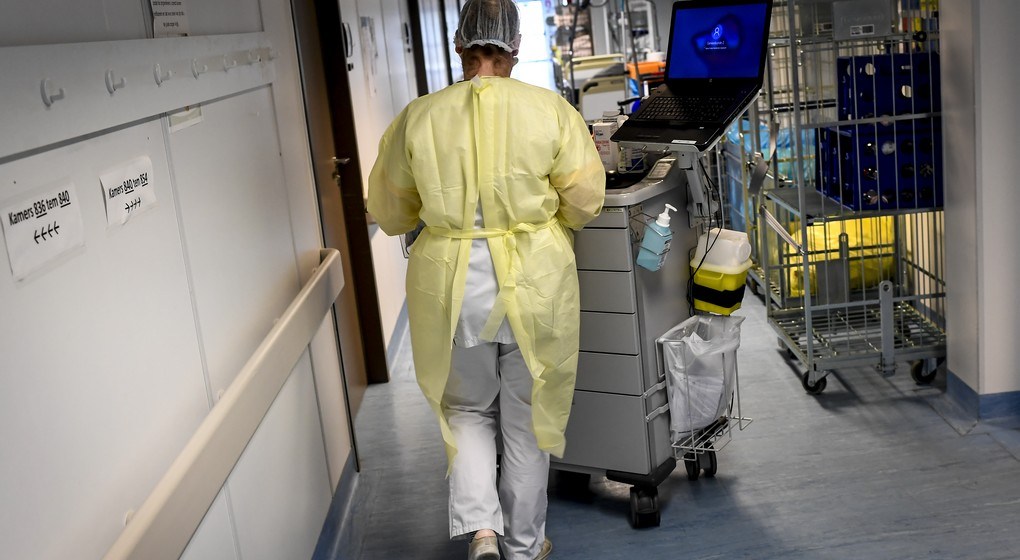1,487 new people have tested positive for the new coronavirus (Covid-19) in Belgium, confirmed the Federal Public Health Service during a press conference on Monday.
This brings the total number of cases in Belgium, since the beginning of the pandemic, to 39,983. The total reflects all people in Belgium who have been infected, and includes confirmed active cases as well as patients who have since recovered, or died from the consequences of the virus.
550 of the newly-infected people live in Flanders, 693 live in Wallonia, and 238 live in Brussels. The FPS does not yet have further information on the place of residence of 6 other people.
“800 of those positive results come from the classical testing network. 687 come from tests taken in the residential care centres, which are still ongoing,” said Professor Steven Van Gucht of the coronavirus crisis centre. In total, 161,896 coronavirus tests have been taken in Belgium, of which 8,118 in the past 24 hours.
232 new patients were admitted to the hospital in the last 24 hours, while 138 new people have been discharged, bringing the total number of people in hospital because of the coronavirus at the moment to 4,920, an increase of 49 patients.
“Of the patients in the hospital, 1,071 are in the intensive care unit, which is a decrease of 10 patients,” said Van Gucht, adding that of those patients in the ICU, 760 are on a respirator.
168 new deaths have been reported, of which 62 occurred in the hospital, and were confirmed cases. 103 of the deaths were reported by the residential care centres, of which 3% were confirmed, and 97% were suspected cases.
Of the newly-reported deaths, 84 occurred in Flanders, 56 in Wallonia, and 28 in Brussels. The total number of deaths in Belgium since the beginning of the pandemic is currently 5,828. “Of that number, 47% occurred in hospitals,” added Van Gucht.
Related News
- Coronavirus: Belgium tops the world in number of deaths in relation to population
- Coronavirus: hospital admissions in Belgium drop below 5,000
- Coronavirus: Germany relaxes lockdown measures
The FPS Health showed two curves, which showed two scenarios of the epidemic in Belgium that were calculated by researchers at the University of Hasselt.
"In the first scenario, the curve immediately goes straight up, and shows that the number of cases that we would very probably have had if we had not taken any lockdown measures, which results in an overload of our health care system," said Van Gucht.
"The second scenario shows what would have happened if Belgium had let go of all the measures on 16 April, which once again shows an exponential increase in the number of cases, which also would have resulted in an overload of our health care system, but later in time," he said.
"In order to keep the curve as flat as possible, and to make sure it goes down further, and if we want to let go of some measures, we will need to remain vigilant. By, for example, focussing strongly on testing, and keep respecting some measures about keeping our distance from others," added Van Gucht.
"The opening of the garden centres and the DIY-stores has, in general and in most places, gone smoothly. With this positive attitude, we will be able to get through this together," said Yves Stevens, a spokesperson of the National Crisis Centre.
"We want to thank everyone for this positive attitude, as the large majority of people has acted responsibly. The curve and the daily update may seem like abstract data to many, but it is a reflection of the past several weeks and our behaviour," Stevens said.
"The figures are encouraging, but let them not be a signal to start relaxing our behaviour towards the measures. The curve has to go down further. We have to persevere," said Stevens. "Together, we can do this," he added.
Update: The number of patients confirmed with the new coronavirus (Covid-19) in Belgium is 40,956, as of Tuesdat 21 April. Read more about it here.
Maïthé Chini
The Brussels Times

